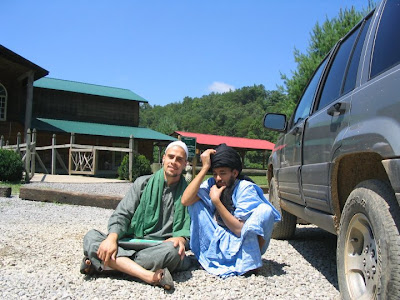Photo's,video's,biographies and articles detailing a few of the important people and places in the religion of Islam.
Wednesday, July 28, 2010
Sunday, July 25, 2010
Ya Nafs (poem by Murabit al Hajj)

During his youth, Murabit al-Hajj authored a poetic didactic of self-
reproach and encouragement for his spiritual travel. He titled his
counsel "Ya Nafsu!" or, "O Self!" where he warns himself of the
dangers of heedlessness, disobedience and wasting time and reminds
himself of the bounties of Allah.
يا نفس قومي فارعوي وانزجري وفجأة الحمام منها فاحذري
ولذة الدنيــا جميعا فاهجري لاسيما الهجوع وقت السحر
Translation: Oh Self, Get up, abstain, restrain yourself and pay heed to sudden death. Abandon all worldly pleasures, in particular sleeping through the early dawn.
(Shaykh Hamza Yusuf mentions Murabit al Hajj has not slept through the time before dawn in over 80 years.)
Saturday, July 24, 2010
Tuesday, July 20, 2010
Monday, July 19, 2010
Saturday, July 17, 2010
Wednesday, July 14, 2010
Monday, July 12, 2010
Shaykh Muhammad ibn al Habib

He is guide to Allah and shaykh of the Darqawi tariqa, Sayyidi Muhammad ibn al-Habib ibn as-Siddiq al-Amghari al-Idrisi al-Hasani.
His ancestors were based in Marrakech a descendant of a line which goes back to 'Ali and Hasan. This branch of the family emigrated to Tafilalat and settled there. His father emigrated to Fes, settled there and his descendants still live there.
His birth and primary education:
He was born in Fes, the cradle of knowledges and fount of gnoses, in 1295 AH. At the proper age, he went to the Qur'anic kuttab at Qantara Abu'r-Ru'us in the Sharabiliyyin quarter where he studied with the faqih and righteous wali, Sidi al-Hashimi as-Sanhaji, learning the basics of reading and writing and recitation of the Noble Qur'an. He also studied that with the faqih Sidi Ahmad al-Filali in the school of Qasba an-Nawwar and memorised the Qur'an under him.
His secondary education and instruction:
After he completed his goal in the Qur'an school, he left it and began to imbibe the finest nectar of dependable education and beneficial knowledge from its pure springs. That was around 1312. In the Abu'l-Junud Mosque in Fes he studied with the renowed faqih with pure recitation, Sidi Mahmad al-Irari, concentrating on the Ajrummiyya, the Alfiyya and as-Sullam by Bannani and the Qualities of Muhammad by at-Tirmidhi.
Then in the Qarawiyyin mosque, which enjoys widespread renown, he studied the Mukhtasar of Khalil with az-Zurqani, Bannani and al-Kharashi with the faqih and Shaykh of the Community, Sidi Ahmad ibn al-Jilali al-Amghari.
He studied the Tuhfa with the commentary of Shaykh at-Tawudi ibn Sawda and the Collection of the Adab of the Teacher and Student by Shaykh Khalil with the faqih Sidi Abu Bakr ibn al-'Arabi Bannani.
He studied part of the Sahih of Imam al-Bukhari and the Hikam of Ibn 'Ata'llah with the faqih Sidi Ahmad ibn al-Khayyat az-Zargari.
He studied az-Zaqqaqiyya with the margin which the shaykh himself wrote on it with the faqih Sidi 'Abdu's'-Salam al-Huwari.
He studied the Alfiyya with al-Makudi and al-Muwaddih with the faqih Sidi Khalil al-Khalidi.
He studied part of the Jami' al-Jawami' and part of the Musnad of Ahmad ibn Hanbal with the faqih Muhammad ibn Ja'far al-Kittani .
He studied part of the Mukhtasar of Khalil, a summary of the Mukhtasar as-Sa'd, and part of Tawhid al-Murshid with the commentary of Shaykh at-Tayyib ibn Kiran with the faqih who is skilled in knowledge and a master of sciences, Sidi J. Muhammad Fatha Junun.
From the faqih and Shaykh of Islam, Moulay 'Abdullah ibn Idris al-Badrawi, he learned the Sahih of al-Bukhari, part of the Mukhtasar of Khalil, al- Isti'ara of Shaykh at-Tayyib ibn Kiran, and part of the Hamziyya by al-Busiri with the commentary of Ibn Hajar.
He learned part of the Mukhtasar of Khalil, ash-Shifa' by Qadi Abu'l-'l-Fadl 'Iyad as-Sibti and part of al-Murshid al-Mu'in by Mayyara from the Sufi faqih, Sidi Hammad as-Sanhaji.
He learned al-Murshid al-Mu'in from the faqih Sidi Muhammad ibn 'Abdu'r-Rahman al-Filali.
Then he stopped his studies in 1319 when he achieved his desire and filled himself with knowledge and education, and he began to teach knowledge on a voluntary basis in the mosque of Qasba an-Nawwar in Fes, teaching al-Murshid al-Mu'in, the Mukhtasar of Khalil, the Muwatta' of Imam Malik, as-Sanusiyya, and tafsir. He continued to undertake the tasks of his educational and secondary work until he emigrated to the city of Meknas and took up residence there in 1355. There he continued his distinguished scholarly activity by giving lessons in the Zaytuna mosque on tafsir and fiqh using the Risala of al-Qayrawani, and in tasawwuf using the Hikam of Ibn 'Ata'llah and al-Murshid al-Mu'in, and ash-Shifa of Qadi 'Iyad, and as-Sullam by Bannani and the Alfiyya by al-Makudi.
His ijazas:
Shaykh Sidi Badru'd-din ad-Dismishqi gave him a written ijaza in Damascus and he also received one from the Qadi of Tlemcen, Sidi Abu Shu'ayb, and he had oral ijazas from the scholar Sidi Ahmad ibn al-Jilali al-Amghari, and the faqih Sidi Abu Bakr ibn al-'Arabi Bannani.
His journeys:
In 1350 he travelled to the holy lands to perform the blessed obligation of the hajj and went to the land of Kinana. He met with some of its scholars, including Shaykh Bakhit al-Muti'i and Shaykh as-Simaluti. He travelled to Syria and met some of its scholars, including Tawfiq al-Ayyubi and Shaykh Badur'd-din ad-Dimishaqi. He went to Algiers also after that and met some of its scholars. Among them in Blida he met Shaykh Sidi Muhammad ibn Jalul and Sidi Ahmad, and to Fagig in the area of Oujda and meet its scholars, including the Shaykh al-Islam, Sidi Muhammad al-Qadi and Qadi Sidi Jalul. He gave lessons there on the Sahih of al-Bukhari and al-Murshid al-Mu'in with the commentary of Shaykh at-Tayyib ibn Kiran.
Then he travelled to the Hijaz and made hajj to the Sacred House of Allah again in about 1360.
Then he set out from the Isma'ili capital, Meknas, in the company of his wives, making for the pure lands to perform a third hajj to the sacred House of Allah in 1391, but died on the way before achieving his desired goal. So the words of Allah Almighty which are unequivocally clear apply to him: "If anyone leaves his home, making hijra to Allah and His Messenger, and death catches up with him, it is Allah who will reward him. Allah is Ever-Forgiving, Most Merciful." (4:100) The Prophet, peace and blesing be upon him, said, in a noble hadith, "Whoever leaves in this way for hajj or 'umra and dies during it will not be examined or reckoned and will be told to enter the Garden."
His intellectual legacy:
He wrote a diwan which is called "The Desire of the Travelling Murids and the Gift of the Wayfaring Gnostics". It has been published twice. He wrote a commentary on the Hafidha of the Shaykh Sidi Muhammad al'Arabi al-'Alawi al-Madghari which contains supplications of the Prophet, ayats of Qur'an and some of the Shadhili hizbs. He also wrote a commentary on the Salat al-Mashishiyya.
[The Arabic diwan is available from Bookwork.]
His scholarly position:
He was a scholar and faqih with great perception. He was familiar with many sciences, while being particularly proficient in tafsir and tasawwuf.
His poety:
He dipped a bucket in the well of poetry when his talent produced several qasidas about tasawwuf, good character, praise of Allah, praise of the Prophet and religious admonitions.
His death and burial:
He moved to his Lord with his face directed towards the Holy lands to perform hajj to the Sacred House of Allah in the city of Blida, Algeria, on Monday, 23 Dhu'l-Qa'da, 1391. He was buried in the same day in the Darqawi zawiya which was recently built and he himself had inaugurated. That was in the Belqasim al-Wizri Street in Blida. Then he was moved from this burial place to his second home, the city of Meknes, where he was re-buried after 'Asr on Monday 14 Dhu'l-Hijja of the same year in his zawiya in the place where he had ordered that he be buried, in Darb al-Pasha, near the Zaytuna msoque.
May Allah forgive his sins and veil his faults and accept him with honour and beautiful covering and make him dwell in the highest part of 'Illiyin in the company of the Prophets, truthful, martyrs and righteous. Amen.
Add a caption
He is guide to Allah and shaykh of the Darqawi tariqa, Sayyidi Muhammad ibn al-Habib ibn as-Siddiq al-Amghari al-Idrisi al-Hasani.
His ancestors were based in Marrakech a descendant of a line which goes back to 'Ali and Hasan. This branch of the family emigrated to Tafilalat and settled there. His father emigrated to Fes, settled there and his descendants still live there.
His birth and primary education:
He was born in Fes, the cradle of knowledges and fount of gnoses, in 1295 AH. At the proper age, he went to the Qur'anic kuttab at Qantara Abu'r-Ru'us in the Sharabiliyyin quarter where he studied with the faqih and righteous wali, Sidi al-Hashimi as-Sanhaji, learning the basics of reading and writing and recitation of the Noble Qur'an. He also studied that with the faqih Sidi Ahmad al-Filali in the school of Qasba an-Nawwar and memorised the Qur'an under him.
His secondary education and instruction:
After he completed his goal in the Qur'an school, he left it and began to imbibe the finest nectar of dependable education and beneficial knowledge from its pure springs. That was around 1312. In the Abu'l-Junud Mosque in Fes he studied with the renowed faqih with pure recitation, Sidi Mahmad al-Irari, concentrating on the Ajrummiyya, the Alfiyya and as-Sullam by Bannani and the Qualities of Muhammad by at-Tirmidhi.
Then in the Qarawiyyin mosque, which enjoys widespread renown, he studied the Mukhtasar of Khalil with az-Zurqani, Bannani and al-Kharashi with the faqih and Shaykh of the Community, Sidi Ahmad ibn al-Jilali al-Amghari.
He studied the Tuhfa with the commentary of Shaykh at-Tawudi ibn Sawda and the Collection of the Adab of the Teacher and Student by Shaykh Khalil with the faqih Sidi Abu Bakr ibn al-'Arabi Bannani.
He studied part of the Sahih of Imam al-Bukhari and the Hikam of Ibn 'Ata'llah with the faqih Sidi Ahmad ibn al-Khayyat az-Zargari.
He studied az-Zaqqaqiyya with the margin which the shaykh himself wrote on it with the faqih Sidi 'Abdu's'-Salam al-Huwari.
He studied the Alfiyya with al-Makudi and al-Muwaddih with the faqih Sidi Khalil al-Khalidi.
He studied part of the Jami' al-Jawami' and part of the Musnad of Ahmad ibn Hanbal with the faqih Muhammad ibn Ja'far al-Kittani .
He studied part of the Mukhtasar of Khalil, a summary of the Mukhtasar as-Sa'd, and part of Tawhid al-Murshid with the commentary of Shaykh at-Tayyib ibn Kiran with the faqih who is skilled in knowledge and a master of sciences, Sidi J. Muhammad Fatha Junun.
From the faqih and Shaykh of Islam, Moulay 'Abdullah ibn Idris al-Badrawi, he learned the Sahih of al-Bukhari, part of the Mukhtasar of Khalil, al- Isti'ara of Shaykh at-Tayyib ibn Kiran, and part of the Hamziyya by al-Busiri with the commentary of Ibn Hajar.
He learned part of the Mukhtasar of Khalil, ash-Shifa' by Qadi Abu'l-'l-Fadl 'Iyad as-Sibti and part of al-Murshid al-Mu'in by Mayyara from the Sufi faqih, Sidi Hammad as-Sanhaji.
He learned al-Murshid al-Mu'in from the faqih Sidi Muhammad ibn 'Abdu'r-Rahman al-Filali.
Then he stopped his studies in 1319 when he achieved his desire and filled himself with knowledge and education, and he began to teach knowledge on a voluntary basis in the mosque of Qasba an-Nawwar in Fes, teaching al-Murshid al-Mu'in, the Mukhtasar of Khalil, the Muwatta' of Imam Malik, as-Sanusiyya, and tafsir. He continued to undertake the tasks of his educational and secondary work until he emigrated to the city of Meknas and took up residence there in 1355. There he continued his distinguished scholarly activity by giving lessons in the Zaytuna mosque on tafsir and fiqh using the Risala of al-Qayrawani, and in tasawwuf using the Hikam of Ibn 'Ata'llah and al-Murshid al-Mu'in, and ash-Shifa of Qadi 'Iyad, and as-Sullam by Bannani and the Alfiyya by al-Makudi.
His ijazas:
Shaykh Sidi Badru'd-din ad-Dismishqi gave him a written ijaza in Damascus and he also received one from the Qadi of Tlemcen, Sidi Abu Shu'ayb, and he had oral ijazas from the scholar Sidi Ahmad ibn al-Jilali al-Amghari, and the faqih Sidi Abu Bakr ibn al-'Arabi Bannani.
His journeys:
In 1350 he travelled to the holy lands to perform the blessed obligation of the hajj and went to the land of Kinana. He met with some of its scholars, including Shaykh Bakhit al-Muti'i and Shaykh as-Simaluti. He travelled to Syria and met some of its scholars, including Tawfiq al-Ayyubi and Shaykh Badur'd-din ad-Dimishaqi. He went to Algiers also after that and met some of its scholars. Among them in Blida he met Shaykh Sidi Muhammad ibn Jalul and Sidi Ahmad, and to Fagig in the area of Oujda and meet its scholars, including the Shaykh al-Islam, Sidi Muhammad al-Qadi and Qadi Sidi Jalul. He gave lessons there on the Sahih of al-Bukhari and al-Murshid al-Mu'in with the commentary of Shaykh at-Tayyib ibn Kiran.
Then he travelled to the Hijaz and made hajj to the Sacred House of Allah again in about 1360.
Then he set out from the Isma'ili capital, Meknas, in the company of his wives, making for the pure lands to perform a third hajj to the sacred House of Allah in 1391, but died on the way before achieving his desired goal. So the words of Allah Almighty which are unequivocally clear apply to him: "If anyone leaves his home, making hijra to Allah and His Messenger, and death catches up with him, it is Allah who will reward him. Allah is Ever-Forgiving, Most Merciful." (4:100) The Prophet, peace and blesing be upon him, said, in a noble hadith, "Whoever leaves in this way for hajj or 'umra and dies during it will not be examined or reckoned and will be told to enter the Garden."
His intellectual legacy:
He wrote a diwan which is called "The Desire of the Travelling Murids and the Gift of the Wayfaring Gnostics". It has been published twice. He wrote a commentary on the Hafidha of the Shaykh Sidi Muhammad al'Arabi al-'Alawi al-Madghari which contains supplications of the Prophet, ayats of Qur'an and some of the Shadhili hizbs. He also wrote a commentary on the Salat al-Mashishiyya.
His death and burial:
He moved to his Lord with his face directed towards the Holy lands to perform hajj to the Sacred House of Allah in the city of Blida, Algeria, on Monday, 23 Dhu'l-Qa'da, 1391. He was buried in the same day in the Darqawi zawiya which was recently built and he himself had inaugurated. That was in the Belqasim al-Wizri Street in Blida. Then he was moved from this burial place to his second home, the city of Meknes, where he was re-buried after 'Asr on Monday 14 Dhu'l-Hijja of the same year in his zawiya in the place where he had ordered that he be buried, in Darb al-Pasha, near the Zaytuna msoque.
May Allah forgive his sins and veil his faults and accept him with honour and beautiful covering and make him dwell in the highest part of 'Illiyin in the company of the Prophets, truthful, martyrs and righteous. Amen.

Saturday, July 10, 2010
Wednesday, July 7, 2010
Dr Umar F Abd-Allah

Dr. Umar Faruq Abd-Allah was born in 1948 to a Protestant family in Columbus, Nebraska. He grew up in Athens, Georgia, where both parents taught at the University of Georgia. His father taught Veterinary Medicine and Organic Chemistry, while his mother’s field was English. In 1964, his parents took positions at the University of Missouri in Columbia, where his grandfather had been a professor emeritus of Veterinary Medicine. Dr. Abd-Allah did his undergraduate work at the University of Missouri with dual majors in History and English Literature. He made the Dean’s list all semesters and was nominated to the Phi Beta Kappa Honorary Society. In 1969, he won a Woodrow Wilson Fellowship and entrance to Cornell University in Ithaca, New York to pursue a Ph.D. program in English literature. Shortly after coming to Cornell, Dr. Abd-Allah read The Autobiography of Malcolm X, which inspired him to embrace Islam in early 1970. In 1972, he altered his field of study and transferred to the University of Chicago, where he studied Arabic and Islamic Studies under Dr. Fazlur Rahman. Dr. Abd-Allah received his doctorate with honors in 1978 for a dissertation on the origins of Islamic Law, Malik’s Concept of ‘Amal in the Light of Maliki Legal Theory. From 1977 until 1982, he taught at the Universities of Windsor (Ontario), Temple, and Michigan. In 1982, he left America to teach Arabic in Spain. Two years later, he was appointed to the Department of Islamic Studies at King Abdul-Aziz University in Jeddah, where he taught (in Arabic) Islamic studies and comparative religions until 2000.
During his years abroad, Dr. Abd-Allah had the privilege of studying with a number of traditional Islamic scholars. He returned to Chicago in August 2000 to work as chair and scholar-in-residence of the newly founded Nawawi Foundation, a non-profit educational foundation. In conjunction with this position, he is now teaching and lecturing in and around Chicago and various parts of the United States and Canada, while conducting research and writing in Islamic studies and related fields. He recently completed a biography of Mohammed Webb (d. 1916), who was one of the most significant early American converts to Islam. The book is scheduled for release Spring/Summer 2006 under the title A Muslim in Victorian America: The Story of Alexander Russell Webb (Oxford University Press). Dr. Abd-Allah is presently completing a second work entitled Roots of Islam in America: A Survey of Muslim Presence in the New World from Earliest Evidence until 1965 and is also updating his dissertation for publication.
Add a caption
Dr. Umar Faruq Abd-Allah was born in 1948 to a Protestant family in Columbus, Nebraska. He grew up in Athens, Georgia, where both parents taught at the University of Georgia. His father taught Veterinary Medicine and Organic Chemistry, while his mother’s field was English. In 1964, his parents took positions at the University of Missouri in Columbia, where his grandfather had been a professor emeritus of Veterinary Medicine. Dr. Abd-Allah did his undergraduate work at the University of Missouri with dual majors in History and English Literature. He made the Dean’s list all semesters and was nominated to the Phi Beta Kappa Honorary Society. In 1969, he won a Woodrow Wilson Fellowship and entrance to Cornell University in Ithaca, New York to pursue a Ph.D. program in English literature. Shortly after coming to Cornell, Dr. Abd-Allah read The Autobiography of Malcolm X, which inspired him to embrace Islam in early 1970. In 1972, he altered his field of study and transferred to the University of Chicago, where he studied Arabic and Islamic Studies under Dr. Fazlur Rahman. Dr. Abd-Allah received his doctorate with honors in 1978 for a dissertation on the origins of Islamic Law, Malik’s Concept of ‘Amal in the Light of Maliki Legal Theory. From 1977 until 1982, he taught at the Universities of Windsor (Ontario), Temple, and Michigan. In 1982, he left America to teach Arabic in Spain. Two years later, he was appointed to the Department of Islamic Studies at King Abdul-Aziz University in Jeddah, where he taught (in Arabic) Islamic studies and comparative religions until 2000.
During his years abroad, Dr. Abd-Allah had the privilege of studying with a number of traditional Islamic scholars. He returned to Chicago in August 2000 to work as chair and scholar-in-residence of the newly founded Nawawi Foundation, a non-profit educational foundation. In conjunction with this position, he is now teaching and lecturing in and around Chicago and various parts of the United States and Canada, while conducting research and writing in Islamic studies and related fields. He recently completed a biography of Mohammed Webb (d. 1916), who was one of the most significant early American converts to Islam. The book is scheduled for release Spring/Summer 2006 under the title A Muslim in Victorian America: The Story of Alexander Russell Webb (Oxford University Press). Dr. Abd-Allah is presently completing a second work entitled Roots of Islam in America: A Survey of Muslim Presence in the New World from Earliest Evidence until 1965 and is also updating his dissertation for publication.
Tuesday, July 6, 2010
Shaykh Muhammad Nuh

Shaykh Muhammad Nuh was a student of Murabit al Hajj for over 30 years, seen here with Shaykh Yahya Rhodus.

He is a descendent of the Prophet Muhammad(saw). Shaykh Muhammad Nuh is said to have always covered his face out of modesty and humbleness from the time he was a child. He now resides in Madina Saudi Arabia.

This tent was his dwelling place in Mauritania.
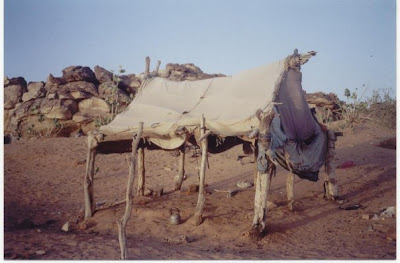
Shaykh Muhammad al-Hasan ibn Ahmad Khadim
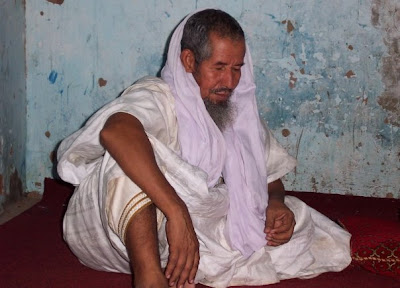

Shaykh Muhammad al-Hasan ibn Ahmad al-Khadim is one of the senior scholars of Mauritania. Extremely pious and humble, the shaykh is a master in every field of the Islamic sciences, without exception. He is also the only Mauritanian scholar who has alot published works (over 30), having written books on fiqh, usul al-fiqh, usul al-hadith and tasawwuf. Among his published works is a commentary on the Alfiyyah of Imam Suyuti (rahimahullah) in usul al-hadith, a commentary on the Nadhm of Jam’ al-Jawami’ of Imam Suyuti (rahimahullah) in usul al-fiqh, a commentary on the Nadhm of Imam al-Kafaf (rahimahullah) in Maliki fiqh and numerous books on tasawwuf.
He is also a senior Sufi shaykh of the Tijani tariqah and very strict in following the Sunnah and wary of bid’ah (innovation). He is busy teaching and writing most of the time, he teaches from 11am to sunset with a break at around noon time.
.

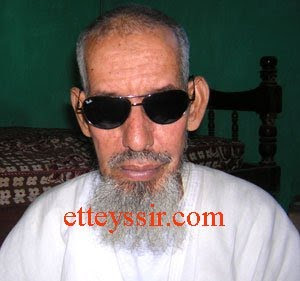
Shaykh Abdallah ould Ahmadna

Shaykh Abdallah is from Mauritania he is the son of Shaykh Ahmad Fal and his mother is the daughter of Shaykh Murabit al Hajj. The Shaykh teaches in the school of his grandfather. Shaykh Abdallah visted the San Francisco Bay Area in the late 90's and inspired many to take the path of seeking knowledge.
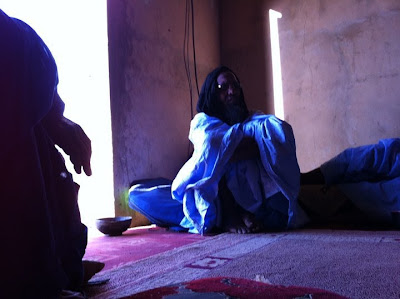
Khalil Moore's account of meeting Murabit al Hajj

(Murabit al Hajj with a visitor)
When I first arrived at the village in which I was to live my life for the next three weeks, I found the great and noble scholar al-Murabit al-Hajj taking his mid-day rest. He is well into his mid-nineties, is of average height, his body being quite weak and feeble. His skin has a warm, dark complexion, from years of exposure to the hot desert sun of the sub-Saharan region, and he has an intense look of simple, but powerful, nobility. There is an aura of dignity and piety that emanates from his presence, an aura that can only be truly captured by direct observation, it just cannot be written about with words on paper. I finally had seen the spiritual father of the pupils that I had been so deeply affected by thus far.
Al-Murabit al-Hajj is a great man of sacred learning and spiritual wisdom and guidance, whom mostly all of Mauritania’s people respect and honor. He spent many years in the study of the various branches of the religious sciences of Islam and their many ramifications. He comes from a great lineage of scholars of both men and women of wondrous piety and austere asceticism. When he was younger he used to move from cave to cave in hopes to avoid the disturbance of the other students and youth in his village. It was finally said to them that they should leave him be: “He is fighting his lower-self [nafs]. When he finishes, then you will see him.” Here he was now, right in front of me. Those hours and days of solitude that he spent in his younger years were necessary for his spiritual training and religious edification. He arrived to his goal years ago. Now we could reap the fruits of his labor and taste something of the blessings that God had bestowed upon him."
Some advice from Murabit al Hajj
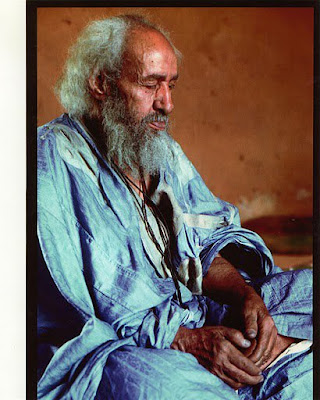
Once when a student was studying Khalil (an advanced book on Maliki Fiqh) with him and asked what a certain word meant in the text, he explained to him that it was a slow and clumsy horse. The student then said, “like so-and-so’s horse?” At this Murabit al-Hajj suddenly became upset and said, “I don’t spend much time with people because they backbite, so if you want to study with me, you must never speak ill of anyone in my presence.
Sunday, July 4, 2010
Subscribe to:
Posts (Atom)








